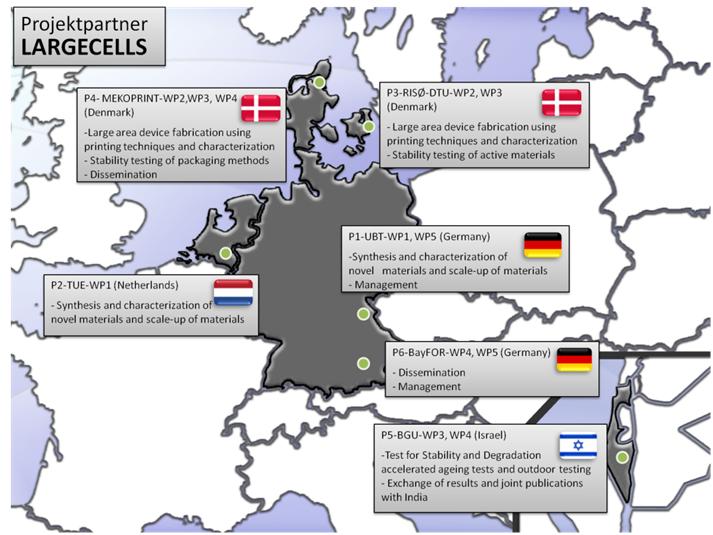
LARGECELLS

Bright future for electricity from plastic
Fossil fuels are becoming increasingly scarce. In order to reduce the levels of climate-impacting carbon dioxide, renewable sources of energy are widely required. Photovoltaics play a particularly crucial role here regarding production of electric power. The problems however are that the production of rigid, inorganic photovoltaic elements from pure silicon requires high amounts of energy and is also expensive. The use of toxic, cost-intensive or rare elements, such as gallium arsenide, cadmium telluride or a combination of copper, indium, gallium, sulphur and selenium in the manufacture of photovoltaic cells is problematic too.
Organic photovoltaics (OPV) is a viable alternative. This technology, which enables the conversion of solar energy using organic materials such as polymers, makes efficient use of resources along the whole chain from production and installation to recycling. Unlike the case with inorganic semi-conductors, electron-hole pairs are created in organic materials when exposed to light. These pairs of holes are first of all separated and removed from the electrodes. The “polymer (polymeric) photovoltaic cells” are printed onto a carrier material (in this instance, onto a plastic sheet) using a roll-to-roll process and then sealed. They can therefore be produced quickly, resourcefully and at a low cost. In addition, they are easy and flexible to use, features which make them perfectly suited to applications involving uneven surfaces.
However, the attribute of large-scale application hasn’t yet been successful due to its comparably low power conversion efficiency. Yet to be researched as well are the long-term stability and the mechanisms of degradation in polymer-based solar cells, which have up to now hampered their practical application or commercialization.
The LARGECELLS project aims to develop low-cost and eco-friendly OPV solutions that can be put to versatile and flexible use. But to do this, the efficiency and long-term stability of OPV technology has to be improved considerably and this is exactly what researchers are aiming for as part of the EU-funded project.
Project Overview
Project aims and fields of work
The LARGECELLS project (Large-area Organic and Hybrid Solar Cells) aims at synthesising new and suitable polymeric functional materials for organic photovoltaic cells, in order to achieve a 100% increase in the efficiency level compared to current cells. Four approaches should help to achieve this aim:
- Synthesis of purely polymeric systems and development of hybrid materials made from organic and inorganic substances with an improved band gap
- Development of optimised donor-acceptor systems by controlling morphology of polymer layers
- Examination of the long-term stability and degradation mechanisms of the new photovoltaics using indoor and outdoor tests with accelerated aging procedures
- Use of a new and ultra-modern manufacture procedure based on roll-to-roll processes for large-scale application of the photovoltaic technology
Target group
The LARGECELLS project results are of significance to the following players:
- The scientific community in the renewable energies, photovoltaic, physics, polymer chemistry and production sectors
- Players in energy supply and architecture
- Political decision-makers
- Interested members of the public
The LARGECELLS consortium informs all the players concerned of the project results by issuing scientific publications, participating in specialist conferences, organising regular workshops and creating information material of interest to the public.
BayFOR as a partner
Prof. Mukundan Thelakkat, Professor of Applied Functional Polymers at the University of Bayreuth, is coordinating the LARGECELLS project.
Dr. Panteleïmon Panagiotou, BayFOR’s Head of Unit for Engineering & Natural Sciences, Information & Communication Technologies, is responsible for managing the LARGECELLS project with the active support of project manager Meike Dlaboha.
The project management activities include compliance with the contractual specifications, financial and organisational management and organisation of communication within the project.
As part of the dissemination work package, BayFOR is also responsible for press and PR work for LARGECELLS. What’s more, BayFOR prepares the LARGECELLS’ scientific project results in a user-friendly manner and communicates them to the relevant user groups. This includes organising local information events, for instance.
Runtime & funding
The LARGECELLS project started on 1 September 2010 and ended on 31 August 2014. The total budget was €3.2 million. As part of the EU’s 7th Framework Programme, the project was funded with €1.64 million. The Indian consortium involved in LARGECELLS was financed separately by the Indian Department of Science and Technology.
Consortium
Under the supervision of Prof. Thelakkat, Professor for Applied Functional Polymers at the University of Bayreuth, four academic partners and two SMEs from Denmark, the Netherlands, Germany and Israel are to collaborate on the “LARGECELLS” project.
In the context of calls for tenders within the 7th Framework Programme (FP7) of the EU, collaboration with certain countries outside the EU is supported. In this case, five top-class scientific institutions from India are taking part in the LARGECELLS project. The Indian researchers will collaborate very closely with their EU colleagues in the area of development of new materials and outdoor tests. Moreover, an intensive exchange of knowledge and personnel has been planned; scientists and students on both sides will visit their colleagues from the other consortium on a regular basis, thus assuring an optimal exchange of knowledge and significant synergies in research work.
The participating partner institutions are:
Universität Bayreuth
Technische Universität Eindhoven
Technical University of Denmark – National laboratory for sustainable energy
Mekoprint Electronics
Ben-Gurion University of the Negev
Bayerische Forschungsallianz
Further information
For more information, please go to:
EMRS – European Materials Research Society
European Photovoltaic Solar Energy Conference
MRS – Materials Research Society
Contact

Prof. Dr. Mukundan Thelakkat
Macromolecular Chemistry I
University of Bayreuth
LARGECELLS Coordination
Phone: +49 (0)921 553108
Email: mukundan.thelakkat@no-spam-pleaseuni-bayreuth.de
Your contact at BayFOR

Dr. rer. nat. Panteleïmon Panagiotou
Head of Unit Information & Communication Technologies |
Engineering & Natural Sciences
Phone: +49 89 9901888-130
Email: panagiotou@no-spam-pleasebayfor.org





